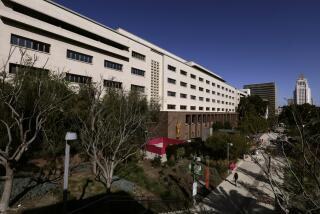Editorial: Some good from the pandemic era: Online access to government meetings
- Share via
The COVID-19 pandemic has been a mixed bag for the public’s oversight of government. The shutdowns prevented people from going to watch city councils, boards of supervisors and state lawmakers do their work and offering direct, face-to-face input. In fact, many government bodies — the Los Angeles County Board of Supervisors, for example — still don’t meet in any publicly accessible location. They conduct meetings from their living rooms or kitchen tables (or, for all anyone knows, from a sandy beach in Cancun), by telephone or other device. The streaming “video” features only their photos, not their actual selves.
None of this would have been legal before the pandemic, which led Gov. Gavin Newsom to issue a series of executive orders suspending open meeting and public access laws to allow essential government business to go forward without furthering the spread of the coronavirus.
For some elected officials (again, L.A.’s supervisors come to mind), the emergency’s silver lining was not having to face members of the public in person and not having to listen to their complaints and comments during open meetings. The supervisors met by teleconference and invited people to submit comments in writing; the public could listen in but could easily be ignored.
But locking the public out was never a part of Newsom’s orders. Governmental bodies that took a more responsible approach to the emergency actually improved public access, participation and oversight, meeting by Zoom, Microsoft’s Teams or some other videoconferencing system to which the public could connect and offer comment.
In fact, the pandemic has created a golden age of public access to the more responsible governmental bodies. For the first time, addressing elected officials in public meetings no longer means fighting traffic, spewing pollutants, finding (and paying for) parking and sitting in a crowded room just to wait for the paltry minute or two that might be allocated for each speaker. People with mobility limitations, previously without access to public meetings, can participate equally. Constituents can dial in, log on or otherwise connect from home, office or car and weigh in on matters that directly affect them.
That’s as it should be. Although the old ways of obtaining public input (face to face, sometimes one at a time, but sometimes in large displays of group solidarity) are reassuring and should continue, it would be foolish to pretend modern communications technology does not exist and cannot make it easier, quicker and cheaper for people to interact with their elected officials.
So when the emergency ends, remote electronic public access should not.
State lawmakers are considering a bill, AB 339, that would modify state open meeting laws to require that remote public access continue permanently, alongside restored in-person access. It’s a good bill and deserves passage.
It’s not, however, as good a bill as it once was. In an earlier form, it applied equally to the state Legislature and its hearings. But state lawmakers being state lawmakers, they wrote themselves out of the requirement. Typical. And shameful, especially given that for most Californians, a trip to Sacramento is far more costly and time-consuming than a trip to City Hall, the school board or any other local government meeting room.
For local bodies, should the requirement apply to all meetings currently covered by open meetings law, as AB 339 would mandate? Every committee and subcommittee? And should video be archived and freely available for public review?
Yes, certainly. There will be a cost for local government, but then, transparency, public access, democracy — none of these things is as cheap in the short run, or as costly in the end, as government conducted behind closed doors and without accountability to the public. The bill requires these costs to be borne by the locals instead of being reimbursed by the state. But the state ought to pitch in to help cover any upfront technology costs.
There are a few loose ends. Remote meeting access has been a financial boon for private technology companies, and that’s fine — but lawmakers should be certain that participation does not require constituents to sacrifice their privacy by having to enter personal data in order to use the remote meeting app or other product.
And then there are those bodies — like, again, the L.A. County Board of Supervisors — that have taken the opportunity presented by the pandemic to halve the number of public meetings and move the most controversial discussions out of public earshot by labelling them “employee evaluations.” If the Legislature is not ready to deal with that kind of thing, the courts should.
More to Read
A cure for the common opinion
Get thought-provoking perspectives with our weekly newsletter.
You may occasionally receive promotional content from the Los Angeles Times.










